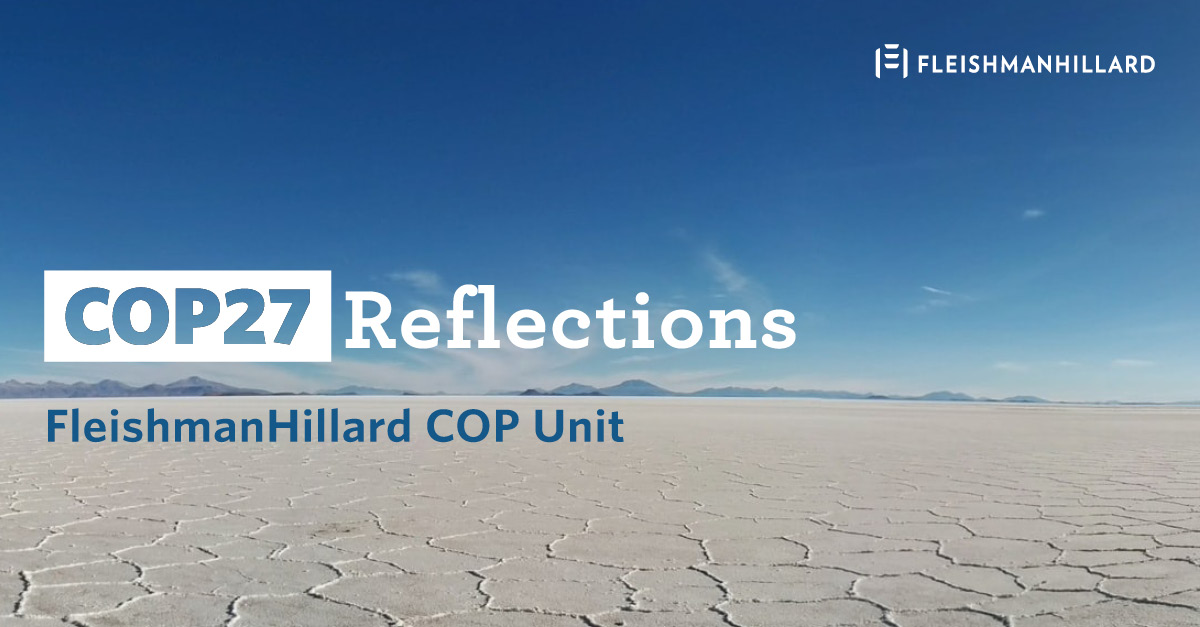COP27 Reflections: Some optimism, need for action and transparency in net zero

Carly Hilkin, Director, Corporate Reputation & Purpose
Heading into COP27 this year, I, like many I expect, felt cynical. How could you not be?
However, watching the first week of conference headlines has struck a slightly different chord. The “implementation COP” has already seen multiple noteworthy successes: Barbados Prime Minister Mia Mottle’s innovative “Bridgetown Agenda” outlining solutions to providing more climate finance was broadly well-received, multiple countries announced new regulations for tackling emissions, and with loss and damage sitting formally on the agenda for the first time, negotiations continue behind the scenes on how to tackle the rapid scale-up of climate adaptation funding and climate finance.
I’m not saying it’s all sunshine and roses, but it does have me sitting up a little taller.
The COP27 agenda and slogan, “Together for Implementation”, stresses the importance of putting plans into action, ensuring greater accountability. The UN Climate Change Executive Secretary stressed the importance of holding everyone to account with implementation through three principles: putting negotiations into action; cementing progress on critical workstreams (such as loss and damages), and enhancing the principles of transparency and accountability throughout the process.
Boosting public-private collaboration
Collaboration between the public and private sectors is critical to innovation in climate finance and technology solutions to tackle the climate crisis. While government reparations for loss and damage are important, speaking as part of an opening keynote on Monday last week, former U.S. Vice President Al Gore emphasised the need to “unlock access to private capital” in order to accelerate the energy transition. Representing the private sector, the First Movers Coalition announced 10 new corporate members – including General Motors, PepsiCo, and Rio Tinto – and confirmed its members had collectively made more than $12bn commitments to invest in cleantech.
Gore also spoke about the importance of working together to drive impact and accountability through “radical transparency,” praising the UN General Secretary for making transparency around net zero goals a priority.
Transparency in net zero
As COP27 leaders discussed the need for greater transparency, corporations face increased scrutiny and concern for greenwashing risk, a subject high on any executive’s radar. On Tuesday, UN experts published a report setting out new proposed standards to harden net-zero claims, as an estimated 80% of global emissions are now covered by pledges that commit to reaching net zero.
“Promises by companies, banks and cities to achieve net-zero emissions often amount to little more than greenwashing” U.N. experts said in a report on Tuesday
It follows a growing movement by regulators across the world to set tougher rules on what actions can be deemed as “environmentally friendly”, ranging from a joint crackdown on brands by the UK Competition and Markets Authority and Advertising Standards Authority, to the EU’s Sustainable Finance Disclosure Regulation, to a recently announced package of measures from the UK Financial Conduct Authority outlining restrictions for how terms like “ESG”, “green” and “sustainable” can be used to describe environmentally friendly investments.
What can communicators do?
Transparent and honest communication about sustainability by default will not only protect against greenwashing risk but is also a positive enabler for corporate climate action.
- Dig into the data: The UN has stated a major focus at COP27 should be to ensure that net zero targets set by nations and non-state actors are credible. Whilst there is still a need for more uniform methodologies and verification systems, multiple new resources have been launched to help improve net zero credibility, including:
- UN Report on Net Zero Emissions Commitments of Non-State Entities includes several recommendations
- Net Zero target-setting guidelines published Friday by the International Organisation for Standardisation (ISO)
Ultimately the takeaway is this: this is a critical moment for identifying gaps in data across supply chains and opportunities to collaborate across sectors to effectively tackle the climate crisis.
- Authenticity is key: Don’t let greenwashing risk mean shying away from talking about the climate crisis – but focus on what is relevant to the work your company is doing in the context of what matters most to your audiences.
- Of the themes at the heart of the COP27 agenda, 63% of people chose renewable energy and energy transformation as a topic that governments and businesses should tackle most urgently. Other priority COP27 themes according to the public include sustainable water resource management, adaptation & agriculture, biodiversity and decarbonisation.
- Push the solutions: A Futerra/Ipsos Mori survey found younger people are becoming more fatalistic about the chances of slowing climate change to an acceptable degree – because 62% say they see much more news about the problem rather than the solution. Focus less on communicating the statistics and more on the solutions driving them.
Despite the barriers, areas of inadequate progress and frustration that some issues are still not receiving full attention, there is an opportunity to turn the dial toward progress at COP27. That means collectively shifting from goal setting to ensuring transparency and pushing actions through new solutions – and doing it with urgency. For communicators, the messages we share should reflect that.
————-
We have another week ahead still at COP27 and our FleishmanHillard COP Unit will continue to share insights and commentary. Want to discuss any topics we’ve covered? Feel free to get in touch.
Contact us
Find Out More
-
Achieving Outsized Impact by Building Stronger Country Reputation
February 18, 2025


